The views expressed in our content reflect individual perspectives and do not represent the authoritative views of the Baha'i Faith.
Our first order of business as humans—to cease being a cause of harm to others—requires turning our attention to our inner selves.
Refining Our Inner Selves
The second principle of creating a beautiful life raises the greater challenge of cleaning up conditions within our own thoughts, feelings, speech and behavior—mastering our inner spiritual domain and bringing it to a state of refinement, purity and selflessness.
In the Baha’i writings, Shoghi Effendi concluded that we can all benefit from such qualities as modesty, purity, temperance, decency and clean-mindedness—because with these qualities we can separate ourselves from attachments and preoccupations with the aspects of life that detract from its purpose:
A race of men, incomparable in character, shall be raised up which, with the feet of detachment, will tread under all who are in heaven and on earth, and will cast the sleeve of holiness over all that hath been created from water and clay. – Baha’u’llah, quoted by Shoghi Effendi in The Advent of Divine Justice, p. 31.
While the forgoing may be the kind of qualities you would expect from a “pure” life, these next two may come as a surprise: Shoghi Effendi recommended “abandonment of frivolous conduct” and “abandonment of trivial and misdirected pleasures.” The terms “frivolous” and “trivial” suggest shallow ripples on the waters of life. We may think we qualify for a pure and holy life simply because we do not commit the worst abominations imaginable, but this admonition informs us that a superficial life may be as odious and offensive as a corrupt one.
Free Yourself from Fear of the Unknown—from Prejudice
The third principle Shoghi Effendi recommended—freedom from all prejudice—requires us to find ways to accept and even love the unknown.
Prejudice means pre-judging—coming to a conclusion before examining something, or becoming familiar with it. If we allow ourselves to be driven into a corner by such fear, our own ignorance will imprison us. Our social world will shrink into the smallest place it can find in order to associate with the familiar and avoid the unknown.
While the most common excuse for prejudicial avoidance of each other is race or color, other forms of prejudice also bedevil our freedom of movement and communication, rendering us averse to people who differ from us in gender, age, abililty, ethnicity, nationality or other qualities. The Baha’i teachings call us to a different order of human development—having such a degree of mutual acceptance, welcome, and concord that our collective life together, more than merely harmonious, will feel like living as one soul, one fully integrated and inter-related being. Can we begin to imagine what it would feel like to be so attuned with each other?
Since We have created you from one same substance it is incumbent on you to be even as one soul, to walk with the same feet, eat with the same mouth and dwell in the same land, that from your inmost being, by your deeds and actions, the signs of oneness and the essence of detachment may be made manifest. – Baha’u’llah, The Hidden Words, p. 20.
Eliminating our prejudices would mean that from our inmost being would emanate a certainty that we are one; and our freedom from fear and estrangement would enable us to achieve a cultural resonance as harmonic as that produced by an orchestra emitting perfect musical chords.
Wake Up Grateful
Towards the end of The Advent of Divine Justice, after all its powerful instructions on what it will take to create a harmonious daily life in this world, Shoghi Effendi offered an outpouring of reassurance, like sunshine after a storm. That comforting reassurance sees the trials of this world through the perspective of the worlds to come.
The souls who have passed on, the Baha’i teachings say, now look back into this world and wish they could return. Why? Conditions in the worlds to come do not seem to afford the same opportunities as this earthly one to show forth noble qualities and live in service to others. Without death, how could we be brave? Without scarcity, how could we be generous?
The holy realities of the Concourse on high yearn, in this day, in the Most Exalted Paradise, to return unto this world, so that they may be aided to render some service to the threshold of [Baha’u’llah], and arise to demonstrate their servitude to His sacred Threshold. – Abdu’l-Baha, quoted by Shoghi Effendi in The Advent of Divine Justice, p. 47.
The ones gone before can see us, know what we are doing, and yearn to participate, to render some service to humanity. So we would be wise to ask them to supercharge our efforts and to give us the grace and the ability to complete whatever good works we have begun. The Baha’i teachings call on us to greet every new day with gratitude, enthusiasm and burning commitment to the cause of human unity. Life passes by so quickly, and the opportunities to serve do, too. Let us then celebrate this day with service to others, for it will never come again.




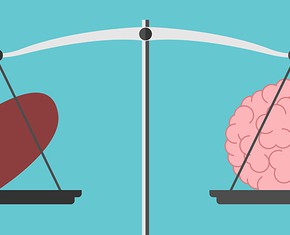





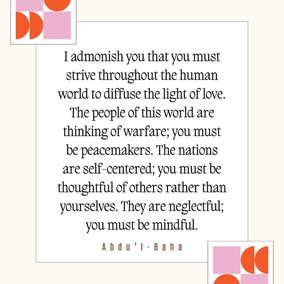
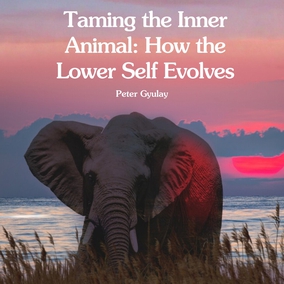
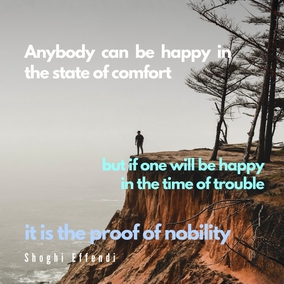
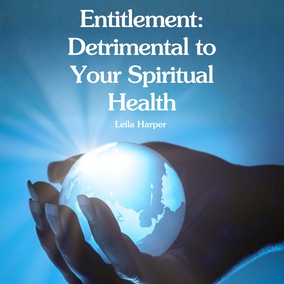
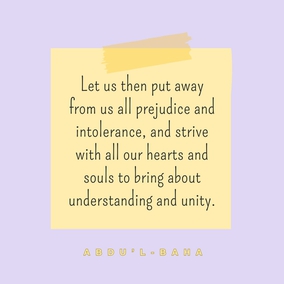

Comments
Sign in or create an account
Continue with Googleor